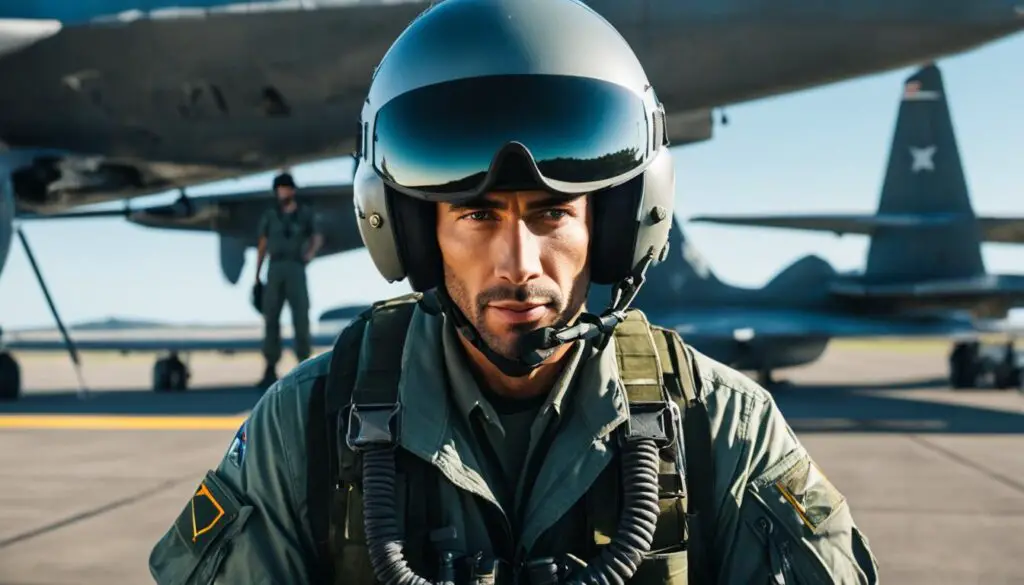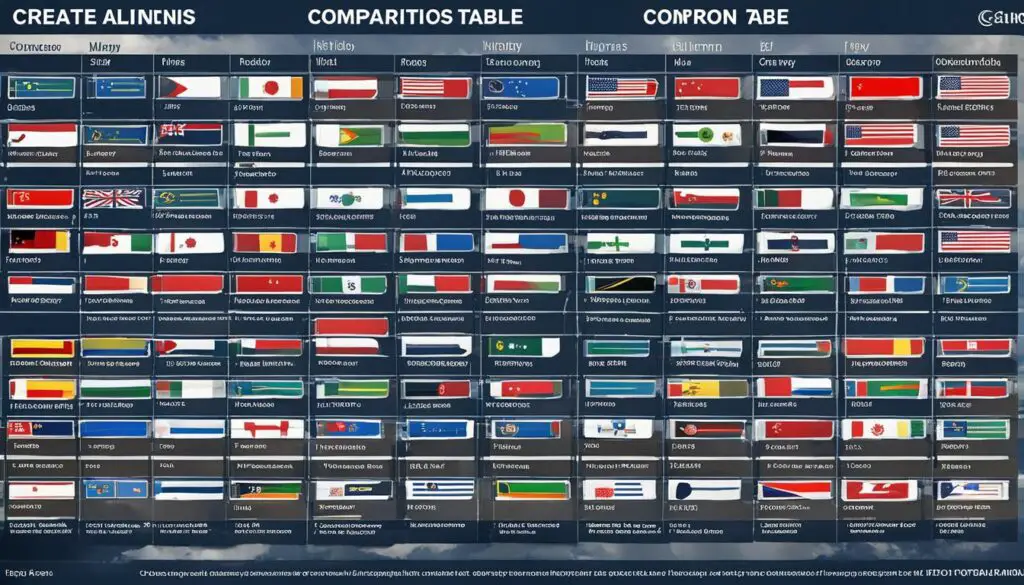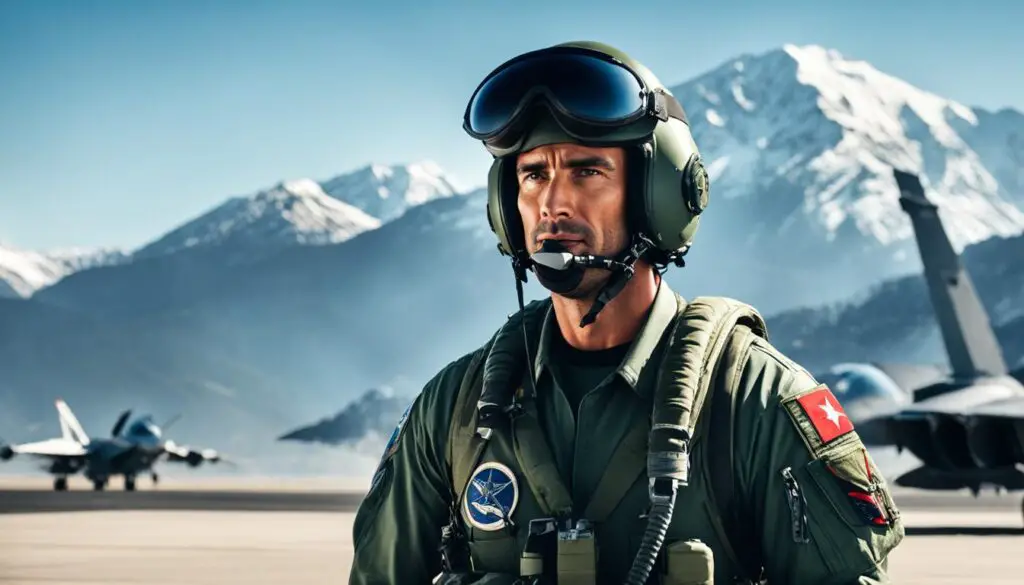
If you’re considering a career as a military pilot, you may be wondering about the opportunities available to you on an international scale. With different countries having varying demand and requirements for military pilots, it’s essential to compare and contrast the options available before deciding on a career path. In this article, we will explore the international chances and opportunities for military pilots and provide insights into the careers available. We will examine the unique challenges and qualifications needed for this profession in different regions worldwide. Whether you’re just starting your career or are considering a change, this article will provide valuable information on the international landscape for military pilots.
Job Profile of a Military Pilot
A military pilot’s job profile involves a wide range of tasks and responsibilities that are essential to maintaining national security and safeguarding against potential threats. Some of the primary tasks of military pilots include:
- Conducting aerial operations in a variety of environments and conditions
- Operating and navigating advanced aircraft systems
- Communicating with ground personnel and coordinating with other military units
- Performing in-flight maintenance and repairs
- Executing tactical maneuvers and engaging in combat operations when necessary
To excel in this profession, military pilots must possess a unique set of skills, including:
- Excellent hand-eye coordination and spatial awareness
- Strong problem-solving and decision-making abilities
- A keen attention to detail and ability to remain calm and focused under pressure
- Exceptional communication and leadership skills
While military pilots are integral to national security, the role also comes with its unique challenges. Pilots may face extended periods away from home and family, and they must be able to cope with the mental and physical demands of long flights and high-stress situations. Furthermore, military pilots must be prepared to adapt to changing circumstances and operate effectively in highly dynamic environments.
Entry Opportunities for Military Pilots
Becoming a military pilot requires meeting strict requirements and completing a rigorous application process. While the exact criteria may vary between countries and branches of the military, common requirements for entry include:
- A minimum age requirement, typically between 18 and 27 years old
- Excellent physical fitness and visual acuity
- A college degree or equivalent training
- Completion of specific military training programs
Additionally, candidates may need to undergo psychological evaluations, security clearances, and drug testing.
It’s important to thoroughly research the requirements for military pilot entry opportunities in your country of interest, as they can vary widely. Keep in mind that competition for these positions will be high, and meeting the minimum requirements does not guarantee acceptance into the program.
| Country/Branch | Application Process Steps |
|---|---|
| United States Air Force |
|
| Royal Air Force (United Kingdom) |
|
| Indian Air Force |
|
When researching entry opportunities for military pilots, it’s also important to consider the types of pilot positions available. Some positions may require additional training or experience, such as helicopter pilot or fighter pilot roles.
Countries with High Demand for Military Pilots
When it comes to countries with high demand for military pilots, a few regions immediately come to mind. The United States, for example, always has a high demand for skilled pilots due to the large number of military bases spread throughout the country. Other regions with a high demand for military pilots include parts of Europe, Asia, and the Middle East.
The industries and sectors that require skilled pilots are varied, but some of the most common include defense, aviation, and aerospace. These industries need pilots who can safely operate advanced aircraft and navigate complex geopolitical environments.
Below is a table outlining some of the regions and industries with high demand for military pilots:

Regions with High Demand for Military Pilots
- United States
- Europe
- Asia
- Middle East
Industries with High Demand for Military Pilots
- Defense
- Aviation
- Aerospace
Aspiring military pilots should consider researching the regions and industries with high demand to identify the best opportunities for their career goals.

The Situation of Military Pilots in the U.S.
Military pilots are an integral part of the United States military forces but their situation varies according to their rank. According to a recent survey by Military Times, military pilots in the U.S. earn an average salary of $120,000 per year. However, this figure varies depending on the type of aircraft they fly, years of experience, and rank.
Air Force pilots typically earn higher salaries than Navy pilots due to the more complex and demanding nature of their missions. For instance, an Air Force Brigadier General earns an average of $170,000 per year, while a Navy Captain earns around $142,000 annually. Moreover, military pilots who work in specialized areas such as aviation medicine or reconnaissance flights tend to earn more than their counterparts in general combat functions.
The demand for military pilots in the U.S. is high and is expected to remain so, especially with the development of new technologies and operational environments. The U.S. Air Force, in particular, will need to train and recruit a significant number of pilots over the next few years to meet the demand.
Overall, military pilots in the U.S. enjoy stable job prospects and high salaries, particularly as they gain more experience and rank up. However, competition for positions can be fierce, and the job can be physically and mentally demanding. Aspiring military pilots should be prepared to undergo rigorous training and meet strict qualifications to succeed in this field.
The Situation of Military Pilots in Europe
In Europe, the situation for military pilots can vary widely depending on the country. While some countries provide extensive training and development opportunities, others may have limited prospects for advancement. It is important for aspiring military pilots to research the situation in their desired destination country to determine the best path forward.
Training Programs Available
The training programs available for military pilots also vary across Europe. Countries like France, Germany, and the United Kingdom offer robust training programs that equip pilots with the skills and experience necessary to excel in their careers. On the other hand, some Eastern European countries have less extensive training programs, which can make it more challenging for individuals to pursue a career as a military pilot.
Opportunities and Challenges
Despite the variation in training programs and opportunities, there are many benefits to pursuing a career as a military pilot in Europe. Pilots in this region may have the chance to work on cutting-edge technology and collaborate with experts in the field. However, there are also challenges, including the need to adapt to different cultures and languages and the potential for limited promotions or career advancement in certain countries.
The Situation of Military Pilots in Other Regions
While the United States and Europe offer significant opportunities for military pilots, the situation in other regions can vary. Different parts of the world may have specific demands, requirements, and challenges that military pilots must consider before pursuing a career. Nevertheless, several regions offer promising prospects for pilots looking to take their career to new heights.
One such region is the Middle East, where countries like Saudi Arabia, the United Arab Emirates, and Qatar have invested heavily in their defense infrastructure and may offer opportunities for skilled pilots. However, cultural differences and the political climate in the region may pose challenges for international applicants.
Another region to consider is Asia, where countries like China, Japan, and South Korea have robust military programs and may require qualified pilots. However, language barriers and strict citizenship requirements may limit the options for foreign pilots.
Overall, understanding the unique situations and requirements of other regions is crucial for military pilots looking to broaden their career prospects. While there may be challenges, the potential for promotion and growth in different parts of the world is undeniable.
Promotion Prospects for Military Pilots in Select Regions
| Region | Promotion Prospects |
|---|---|
| Middle East | Promising prospects due to significant investments in defense infrastructure |
| Asia | Potential for growth in robust military programs, though strict citizenship requirements may limit options for foreign pilots |
| Africa | Opportunities available in countries like Egypt, South Africa, and Nigeria, though political instability and security concerns may present challenges for pilots |

Training and Studies for Military Pilots
Being a military pilot requires extensive training and education to obtain the necessary skills for the job. Aspiring military pilots should obtain a bachelor’s degree from an accredited institution and undergo extensive physical and mental evaluation to ensure they are fit for the role. Military pilots are also required to complete rigorous training programs that include flight training, aircraft systems management, and survival training. Additionally, pilots must maintain their proficiency by attending regular training programs and participating in learning opportunities.
There are several training and educational programs available for individuals interested in pursuing a career as a military pilot. Military academies, such as the United States Air Force Academy and the Royal Air Force College, offer training programs that prepare students for the rigors of military flying. Other institutions, such as Embry-Riddle Aeronautical University, offer programs that provide individuals with the skills necessary to become a successful military pilot.
Continuous learning and skill development are crucial for military pilots throughout their career. Pilots can attend various studies for further training and education on advanced aircraft systems, tactics, and flight safety. These studies can help pilots improve their skills and knowledge that can lead to promotions and career growth.
| Training programs for Military Pilots | Duration |
|---|---|
| Flight Training | 1-2 years |
| Aircraft Systems Management | 6 months – 1 year |
| Survival Training | 2-3 weeks |
| Advanced Aircraft Systems | 1-2 weeks |
The table above shows the duration of some common training programs required for military pilots. It is important to note that the length and content of training programs may vary by country and branch of the military.
Employer Sectors and Industries for Military Pilots
As a military pilot, there are various employment opportunities available across a range of sectors and industries. Some of the most common sectors that employ military pilots include:
- Aerospace and defense
- Commercial aviation
- Emergency services
- Government agencies
- Private aviation
In these sectors, military pilots can work as aircrew members, flight instructors, or aviation management professionals. The demand for military pilots in these sectors is often driven by the need for highly skilled professionals who can operate advanced aircraft and support crucial missions.
To get a better understanding of the demand for military pilots in different industries, check out the table below:
| Industry | Employment Opportunities |
|---|---|
| Aerospace and Defense | Flight Operations Manager, Test Pilot, Aerial Firefighter, Drone Operator |
| Commercial Aviation | Airline Pilot, First Officer, Flight Instructor, Cargo Pilot |
| Emergency Services | Emergency Medical Service Pilot, Firefighting Pilot, Law Enforcement Pilot |
| Government Agencies | Military Operations Officer, Homeland Security Pilot, Intelligence Officer |
| Private Aviation | Corporate Pilot, Personal Pilot, Charter Pilot, Air Tour Guide |
Ultimately, the specific employment opportunities available to military pilots will depend on their qualifications, experience, and career goals. However, with the right skills and training, military pilots can find a wide range of rewarding opportunities in various sectors and industries.
Salary, Development Opportunities, and Promotion Prospects for Military Pilots
Being a military pilot can be a rewarding and lucrative career choice. The salary for military pilots can vary based on factors such as experience, rank, and location. According to the Bureau of Labor Statistics, the median annual salary for pilots in the military was $111,930 as of May 2020. However, this can increase for pilots who hold advanced degrees or have more experience.
Development opportunities for military pilots vary depending on the branch of the military and the specific career path chosen. Pilots can continue to advance their careers by pursuing advanced training, such as becoming an instructor or transitioning to a different aircraft. Promotion prospects are also available as pilots gain more experience and progress through the ranks.
Military pilots may also have the opportunity for civilian career development after their service in the military. They may be able to use their skills and experience to transition into commercial flying or other aviation-related careers. This opens up a plethora of career potential just in case they choose to leave the military service.
In addition, veterans who have served as military pilots have access to various educational and career resources upon their departure from the military. Some employers even offer job fairs specifically for veterans.
| Factors that May Impact Salary and Promotion Prospects for Military Pilots |
|---|
| Rank |
| Location |
| Experience |
| Education level |
| Performance evaluations |
| Specialty training |
Ultimately, salary, development opportunities, and promotion prospects for military pilots can vary greatly based on individual circumstances and career trajectories. However, with dedication, hard work, and a commitment to continuous learning and development, military pilots can enjoy a fulfilling and successful career both during and after their service.
Conclusion
In conclusion, the role of a military pilot offers a range of opportunities on an international scale. As discussed, different countries have varying demands for skilled pilots, and each region has its unique challenges and perks. However, becoming a military pilot is not the only option. Other professions such as commercial pilot, aerospace engineer, or air traffic controller also offer exciting career prospects within the aviation industry.
Overall, the field of aviation offers a wealth of opportunities for individuals interested in this sector, with the potential for job security, development opportunities, and competitive salaries. Aspiring military pilots should consider the various entry routes, training programs, and employer sectors available to them, while also keeping an open mind towards similar professions in the industry.
Questions and Answers
What does the job profile of a military pilot entail?
The job profile of a military pilot involves tasks such as flying and operating military aircraft, conducting missions and operations, maintaining and inspecting aircraft, and adhering to strict safety protocols. It requires strong leadership skills, decision-making abilities, and the ability to handle high-pressure situations.
How can I enter the field of military piloting?
To become a military pilot, you typically need to meet certain qualifications, including a high school diploma or equivalent, physical fitness requirements, and passing aptitude and medical tests. You will also need to apply to a military training program, undergo rigorous training, and obtain the necessary licenses and certifications.
Which countries have a high demand for military pilots?
Countries such as the United States, Russia, China, and several countries in the Middle East have a high demand for military pilots. These countries invest heavily in defense and aviation sectors, offering numerous opportunities for skilled pilots.
What is the current situation of military pilots in the United States?
In the United States, military pilots enjoy competitive salaries and benefits. However, the demand for military pilots may vary depending on the branch of the military and specific roles. The U.S. military offers various career development and promotion opportunities for pilots.
What are the training and educational requirements for military pilots?
Training and educational requirements for military pilots typically include completing a bachelor’s degree program, undergoing flight training through military programs, and obtaining necessary licenses and certifications. The training process involves both classroom instruction and hands-on flight experience.
Which sectors and industries employ military pilots?
Military pilots can find employment in sectors such as defense, aviation, aerospace, and government agencies. They may work for the military directly or be contracted by private companies that provide aviation services to the military.
What salary can I expect as a military pilot?
The salary of a military pilot can vary depending on factors such as rank, experience, and the country in which they are employed. In general, military pilots enjoy competitive salaries and benefits, including allowances and retirement packages.
Are there development opportunities and promotion prospects for military pilots?
Yes, there are development opportunities and promotion prospects for military pilots. As pilots gain experience and demonstrate proficiency, they may be eligible for promotions to higher ranks and more senior positions. They may also have opportunities for further training, specialization, and leadership roles.
What are some similar jobs or professions to military piloting?
Similar jobs or professions to military piloting include commercial airline pilot, helicopter pilot, test pilot, and aerospace engineer. These professions require similar skills and knowledge of aviation principles.

